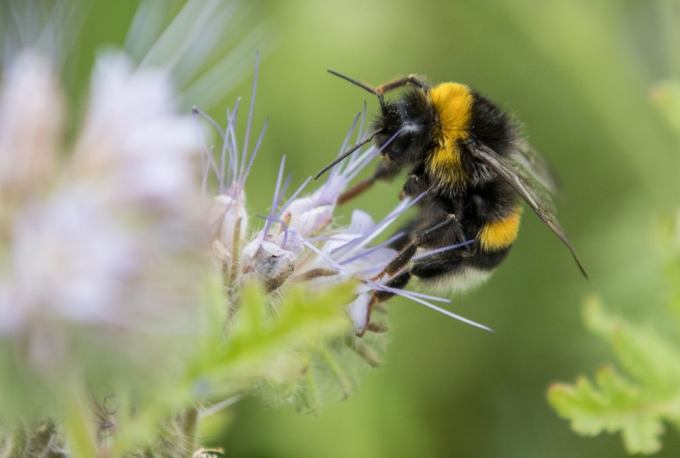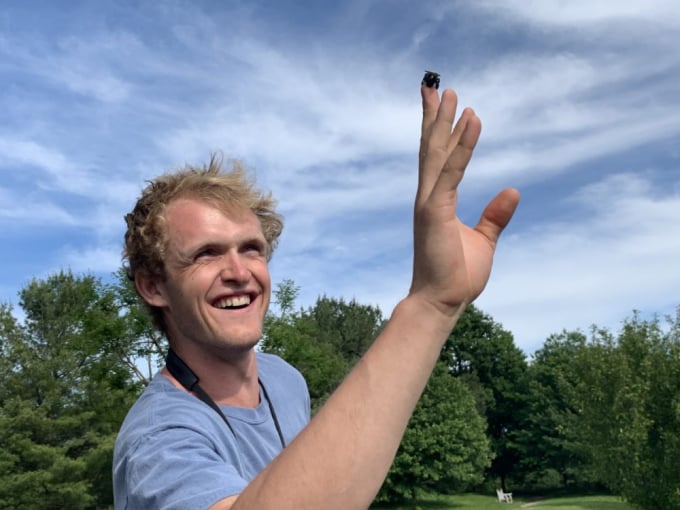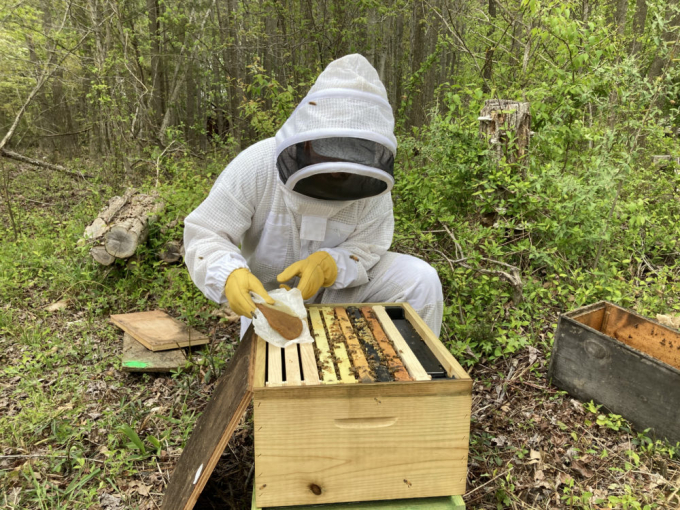November 27, 2025 | 05:29 GMT +7
November 27, 2025 | 05:29 GMT +7
Hotline: 0913.378.918
November 27, 2025 | 05:29 GMT +7
Hotline: 0913.378.918

A bumblebee collects pollen from a flower. (Silas Stein/AFP via Getty Images)
The solution is about the size of a grain of pollen, and when ingested by bees, allows the creatures to come into contact with these pesticides with immunity — like a little bee vaccine. With 98% of the country's hives contaminated by at least six different pesticides and a third of our food reliant on bees for pollination, beekeepers are taking note.
James Webb, a 27-year-old student at Cornell University, developed the idea and co-authored a study about his findings in the journal Nature Food. He's also the founder of the Beemmunity company, which is licensing the technology from Cornell.
Researchers identified an enzyme that can break down harmful pesticides that bees consume. The study showed the enzyme can break down the pesticides and save bees from death or other effects, Webb says.
“We can put microparticles in a sugar feed or even a pollen supplement,” he says, “and they'll happily eat it up.”

James Webb, Cornell researcher and Beemmunity co-founder, with a bee on his finger. (Courtesy ofJames Webb)
The study found 100% of the bees who received the enzyme survived exposure to lethal amounts of pesticide — and 100% of the bees that didn’t died. The effectiveness of the treatment depends on how much pesticide the bees encounter, when the creatures come in contact with pesticide and the size of the dose, Webb says.
“If it's a very severe dose and we have managed to get this treatment just maybe before or just after the bee has come into contact, then it might not work as well,” he says. “But based on beekeepers' feeding practices, we can do a pretty good job of protecting bees.”
This innovation was designed to address a significant group of pesticides known as organophosphates.
Now, Webb’s team is working to improve the design to include different types of pesticides. One design uses an absorptive oil that soaks the pesticides up, and then the bees release them as waste. These microparticles divert the pesticides from the bees’ brain cells, he says.
Researchers found that one drawback to the treatment is the bees might need multiple doses, but Webb says this technology can detoxify entire hives rather than just individual bees.
“This really is a foundation where we can see that without pesticides, bees can make a good comeback,” he says.

Beemmunity co-founder Abraham McCauley feeding bees a pesticide-immunity recipe.(Courtesy ofJames Webb)
In the U.S., the agriculture sector relies on managed pollination services to grow food, Webb says. Beekeepers travel around the country and bring bees into fields to pollinate crops — from cherries to tomatoes to almonds.
But beekeepers are losing around 40% of their colonies every year because of pesticides applied to crops, he says. These losses make beekeeping a less financially viable business.
“If we don't have these beekeepers one day, we might not have the pollination supply to bring us this food,” he says.
That’s because pesticides and a lack of natural forage prevent wild pollinators from doing this important job, he says.
The new technology can help bees withstand pesticides, but Webb argues the U.S. needs to reform how it manages and conserves pollinators in agricultural areas in the long term.
After facing hardship in recent years, beekeepers can be skeptical — but Webb says they’re excited about the innovation.
(wbur.org)

(VAN) A new study reveals how the simultaneous effects of ocean acidification, salinity and loss of oxygen are making the world more fragile.

(VAN) Hopes are growing that the creation of the first 3D turkey gut model could be a turning point in the battle against the virulent blackhead disease.

(VAN) Tyson, America’s biggest meat supplier, plans to shutter one of its largest beef processing plants as the industry continues to struggle with low cattle supplies and political pressure from Washington.

(VAN) New FAO study shows how digital solutions are empowering farmers and fishers to prevent losses and build resilient agrifood systems.

(VAN) Brazil's COP30 presidency pushed through a compromise climate deal on Saturday that would boost finance for poor nations coping with global warming but that omitted any mention of the fossil fuels driving it.

(VAN) Poultry farmers in the UK have been warned that they could face one of the worst winters yet for bird flu.

(VAN) Prices of main-crop paddy have risen sharply, with jasmine rice hitting 16,100 baht per tonne — the highest level in years.